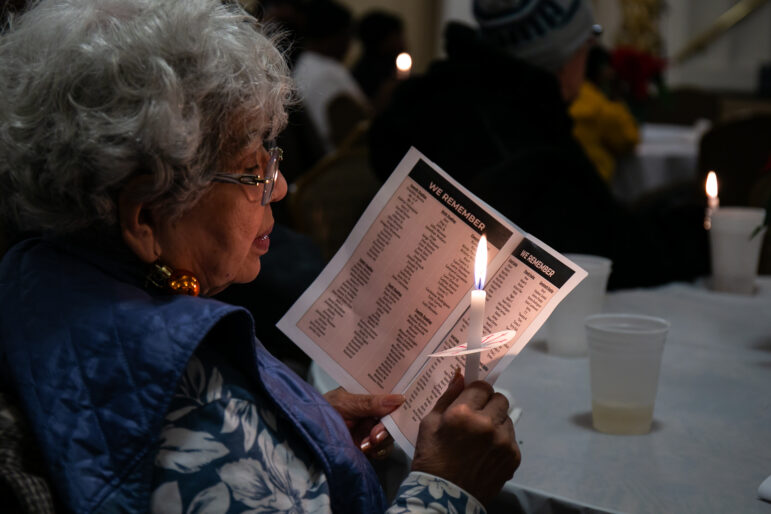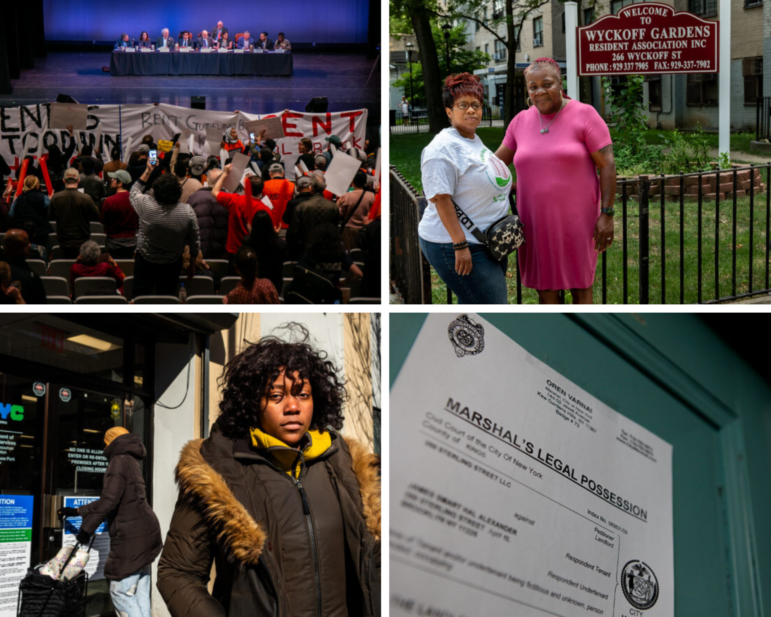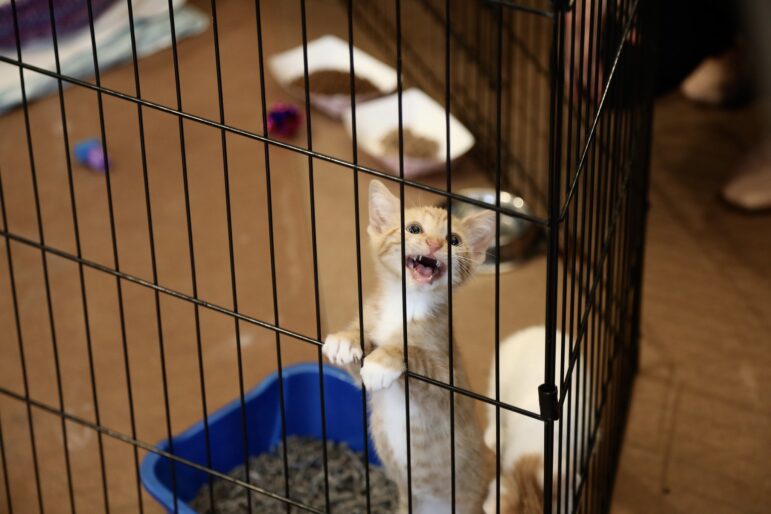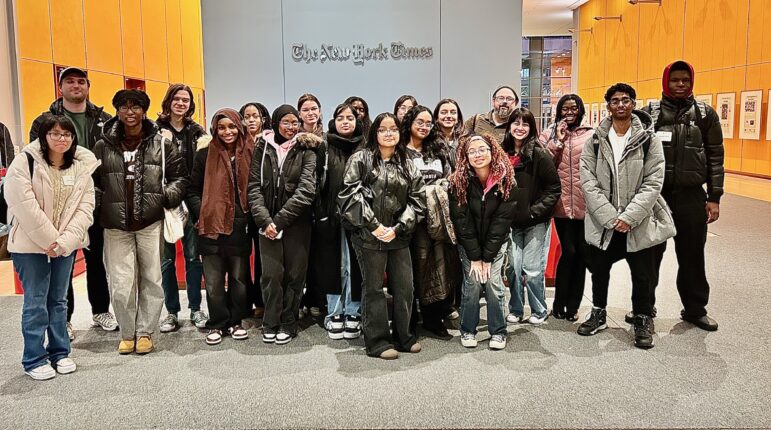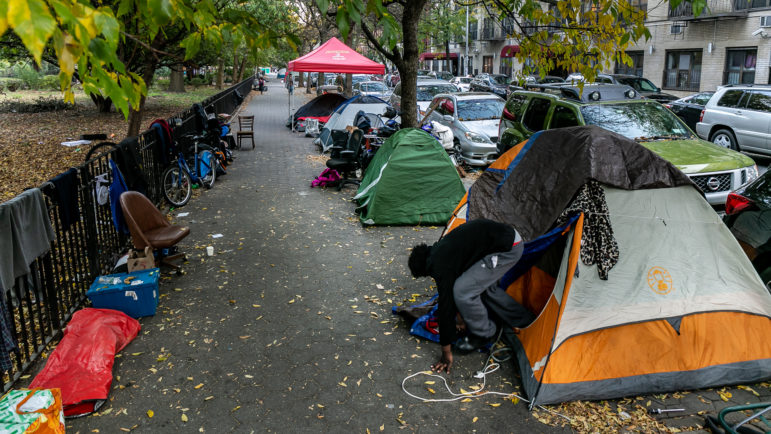‘If our most affluent public school families choose to donate the value of their P-EBT card, New York City charities could reap as much as $150 million.’
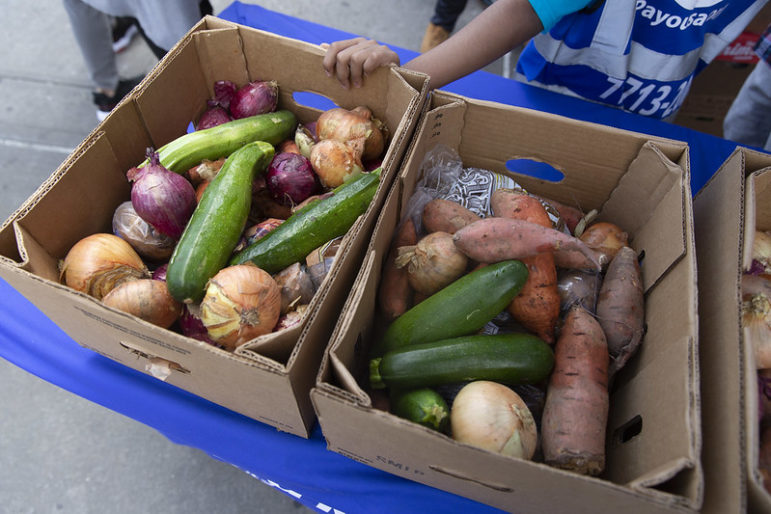
John McCarten/NYC Council
A box of groceries at a food distribution event.Last month, the parents of one million New York City Department of Education (NYC-DOE) students received a form letter in the mail from the New York State Office Temporary and Disability Assistance (NYS-OTDA). Unless a parent already knew to be on the lookout for this letter, they might have just tossed it out. The form letter looks like one of the hundreds of junk mail letters everyone gets all year long.
If you are a DOE parent that did open the letter, you would have found out that your Pandemic-Electronic Benefits Transfer (P-EBT) card has been replenished with $1,300 to cover the months of September 2020 to June 2021 (along with another $260 to cover July and August). The P-EBT card can be used just like a credit card in most grocery stores to buy food.
If our most affluent public school families choose to donate the value of their P-EBT card, New York City charities could reap as much as $150 million.
Due to a federal school free lunch program regulation known as the Community Eligibility Provision (CEP), all NYC-DOE families will benefit equally from P-EBT, regardless of income. For example, a family with an annual income of $1 million or higher will receive the same amount on the P-EBT card as a family struggling on $40,000 a year.
While this may seem counterintuitive, it is also an opportunity for wealthy public school parents to give an unrestricted cash shot in the arm, around $150 million, to our local anti-hunger organizations and other nonprofits. This is because affluent parents can spend down the full value of the card to buy milk, vegetables, fruit and meat at their local grocery store, using their P-EBT card, and then have the option to donate the dollar value on their P-EBT card to nonprofits that served our neediest residents.
What is the Community Eligibility Provision (CEP)?
When I checked with a few parents to see if they know about the P-EBT card, they asked me to explain what law would allow them to get such a nice gift in the mail. To end lunch shaming, where kids were charged for school lunch even though their families were just above the eligibility cutoff (130 percent of the Federal Poverty Level), the Federal Government came up with Community Eligibility Provision (CEP). Under CEP, if a school district has at least 62.5 percent of families receiving SNAP/Medicaid or TANF, the entire school district student body would now be entitled to a free lunch.
In New York City, beginning in the 2017-18 school year, all kids grades Pre-K to 12 were now entitled to a free lunch daily. Despite the meals now being free, the pre-COVID average daily participation still hovers around 65 percent of DOE students. However, because every child, regardless of income, was entitled to a free lunch during the school year, no matter if they ever ate a school lunch, every child is now entitled to the full value of the P-EBT card.
 CityViews are readers’ opinions, not those of City Limits. Add your voice today!
CityViews are readers’ opinions, not those of City Limits. Add your voice today!
How affluent and progressive families can make a big difference
The simplest solution would be to just hand over the P-EBT card to a needy family. The only problem is that P-EBT cards are not transferable. If you do nothing, the money goes back to the U.S. Treasury. That would be the worst outcome, both because the funds would no longer go toward hunger prevention and because our local economy would lose out on those dollars. The farmers that work the neighborhood greenmarkets who have struggled throughout the COVID pandemic would get nothing.
A much better option for people who care about hunger in our community is to do the following: 1) spend down the entire amount of money on your card at your local supermarkets or greenmarkets (many farmers are setup to take the P-EBT card); and 2) of the $1,300 on your P-EBT card, decide how much you want to donate to a charity and how much you want to keep for yourself. 3) write a check or credit card the same way you would for any donation. There is an added incentive for affluent families, as the donation will result in a tax deduction.
More information about the P-EBT program and how to easily order a replacement card can be found on the Community Food Advocates website.
The greatest kind of fundraiser
Any nonprofit will tell you that unrestricted dollars are their most important dollars, for the simple reason the nonprofit decides how best to use the money (instead of a private foundation or government grant program). P-EBT donations could be the largest and least complicated fundraiser a nonprofit ever undertook. There’s almost zero overhead. A few letters emailed, social media postings explaining to your donors how they can convert the dollar value of their P-EBT card to the charity organization.
All that’s required is for New York City’s affluent, progressive families to donate some or all of the value of their P-EBT card to a local charity. No one’s permission is needed. No forms have to be filled out. $150 million! And for our nonprofit organizations, it means a wildly successful fundraiser without the costly overhead and months of planning and staff time.
The larger political context
P-EBT is a federal program administered by the United States Department of Agriculture. The P-EBT program was approved while Donald Trump was president and the Senate was controlled by Republicans; the15 months of P-EBT card coverage has solid bipartisan support.
CEP is also a federal law (also with solid bipartisan support) with thousands of school districts operating the program. Which means that there are affluent parents across the country who are receiving the same missed-meals money on their P-EBT cards, not just NYC parents. An affluent parent in a red state, or a blue state, can donate the value of their P-EBT to their own favorite local charity.
Since P-EBT is a food-based income support program, the charities that come closest would be the anti-hunger organizations, including food banks and food pantries like Food Bank for New York City, City Harvest, Community Food Advocates New York City, Hunger Free America New York and No Kid Hungry New York. There are many others.
There are also many other nonprofits working in the poorest communities of New York. So pick your favorite charity and become an important donor. Help stimulate our local economy by spending these dollars. Do not throw the P-EBT card away.
David Rubel has run a public policy research consulting firm in New York City for the past 25 years.


